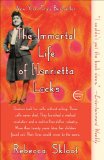Summary | Excerpt | Reading Guide | Discuss | Reviews | Beyond the Book | Readalikes | Genres & Themes | Author Bio

In culture, cancer cells can go on dividing indefinitely, if they have a continual supply of nutrients, and thus are said to be “immortal.” A striking example is a cell line that has been reproducing in culture since 1951. (Cells of this line are called HeLa cells because their original source was a tumor removed from a woman named Henrietta Lacks.)
That was it. I looked up HeLa in my parents’ encyclopedia, then my dictionary: No Henrietta.
As I graduated from high school and worked my way through college toward a biology degree, HeLa cells were omnipresent. I heard about them in histology, neurology, pathology; I used them in experiments on how neighboring cells communicate. But after Mr. Defler, no one mentioned Henrietta.
When I got my first computer in the mid-nineties and started using the Internet, I searched for information about her, but found only confused snippets: most sites said her name was Helen Lane; some said she died in the thirties; others said the forties, fifties, or even sixties. Some said ovarian cancer killed her, others said breast or cervical cancer.
Eventually I tracked down a few magazine articles about her from the seventies. Ebony quoted Henrietta’s husband saying, “All I remember is that she had this disease, and right after she died they called me in the office wanting to get my permission to take a sample of some kind. I decided not to let them.” Jet said the family was angry—angry that Henrietta’s cells were being sold for twenty-five dollars a vial, and angry that articles had been published about the cells without their knowledge. It said, “Pounding in the back of their heads was a gnawing feeling that science and the press had taken advantage of them.”
The articles all ran photos of Henrietta’s family: her oldest son sitting at his dining room table in Baltimore, looking at a genetics textbook. Her middle son in military uniform, smiling and holding a baby. But one picture stood out more than any other: in it, Henrietta’s daughter, Deborah Lacks, is surrounded by family, everyone smiling, arms around each other, eyes bright and excited. Except Deborah. She stands in the foreground looking alone, almost as if someone pasted her into the photo after the fact. She’s twenty-six years old and beautiful, with short brown hair and catlike eyes. But those eyes glare at the camera, hard and serious. The caption said the family had found out just a few months earlier that Henrietta’s cells were still alive, yet at that point she’d been dead for twenty-five years.
All of the stories mentioned that scientists had begun doing research on Henrietta’s children, but the Lackses didn’t seem to know what that research was for. They said they were being tested to see if they had the cancer that killed Henrietta, but according to the reporters, scientists were studying the Lacks family to learn more about Henrietta’s cells. The stories quoted her son Lawrence, who wanted to know if the immortality of his mother’s cells meant that he might live forever too. But one member of the family remained voiceless: Henrietta’s daughter, Deborah.
As I worked my way through graduate school studying writing, I became fixated on the idea of someday telling Henrietta’s story. At one point I even called directory assistance in Baltimore looking for Henrietta’s husband, David Lacks, but he wasn’t listed. I had the idea that I’d write a book that was a biography of both the cells and the woman they came from—someone’s daughter, wife, and mother.
I couldn’t have imagined it then, but that phone call would mark the beginning of a decadelong adventure through scientific laboratories, hospitals, and mental institutions, with a cast of characters that would include Nobel laureates, grocery store clerks, convicted felons, and a professional con artist. While trying to make sense of the history of cell culture and the complicated ethical debate surrounding the use of human tissues in research, I’d be accused of conspiracy and slammed into a wall both physically and metaphorically, and I’d eventually find myself on the receiving end of something that looked a lot like an exorcism. I did eventually meet Deborah, who would turn out to be one of the strongest and most resilient women I’d ever known. We’d form a deep personal bond, and slowly, without realizing it, I’d become a character in her story, and she in mine.
Excerpted from The Immortal Life of Henrietta Lacks by Rebecca Skloot Copyright © 2010 by Rebecca Skloot. Excerpted by permission of Crown, a division of Random House, Inc. All rights reserved. No part of this excerpt may be reproduced or reprinted without permission in writing from the publisher.
Your guide toexceptional books
BookBrowse seeks out and recommends the best in contemporary fiction and nonfiction—books that not only engage and entertain but also deepen our understanding of ourselves and the world around us.